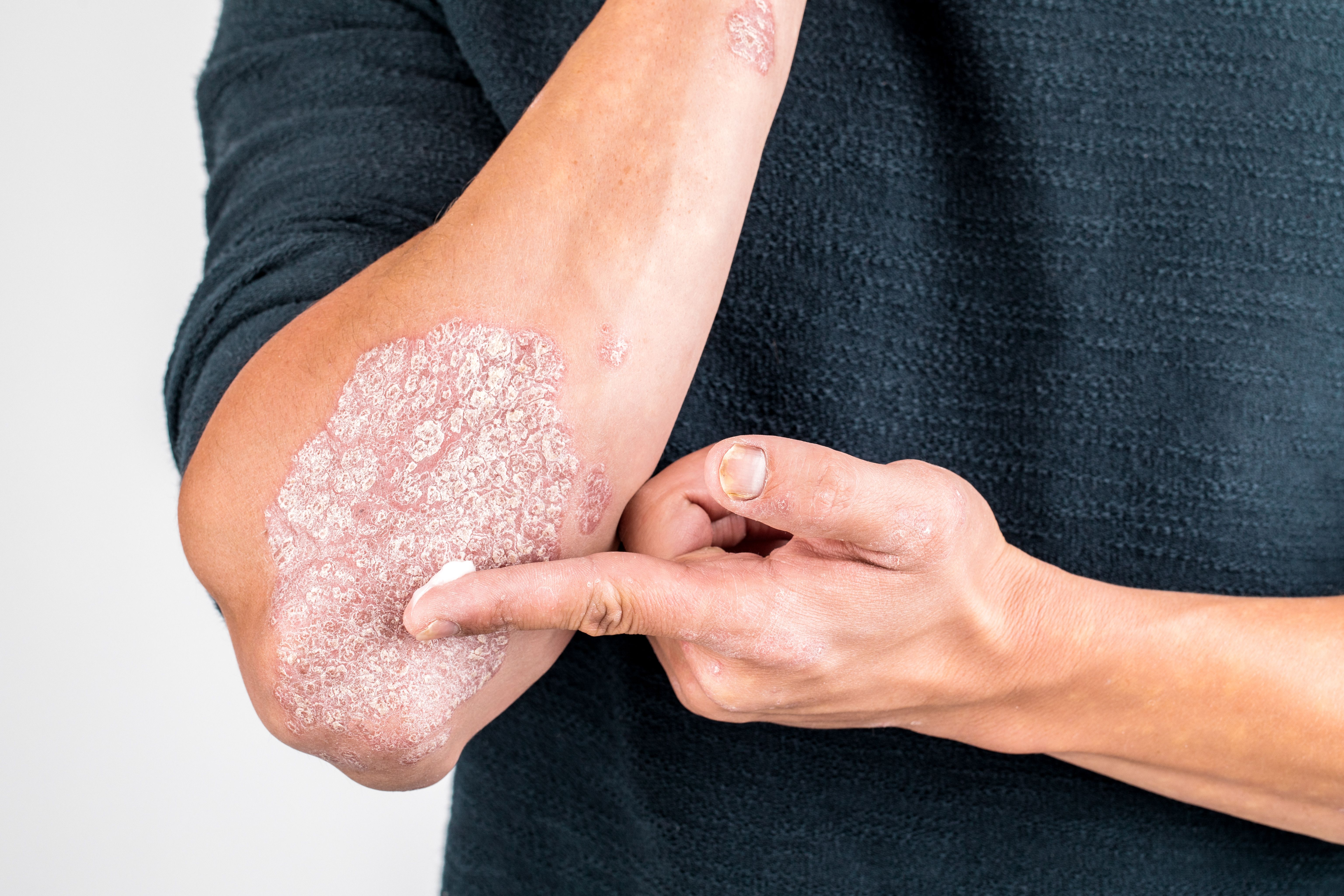- Case-Based Roundtable
- General Dermatology
- Eczema
- Chronic Hand Eczema
- Alopecia
- Aesthetics
- Vitiligo
- COVID-19
- Actinic Keratosis
- Precision Medicine and Biologics
- Rare Disease
- Wound Care
- Rosacea
- Psoriasis
- Psoriatic Arthritis
- Atopic Dermatitis
- Melasma
- NP and PA
- Skin Cancer
- Hidradenitis Suppurativa
- Drug Watch
- Pigmentary Disorders
- Acne
- Pediatric Dermatology
- Practice Management
- Prurigo Nodularis
- Buy-and-Bill
Article
Moderate plaque psoriasis may resolve with apremilast
Author(s):
While there are biologics and systemic agents designed to control the severe form of plaque psoriasis, few treatments work as well in moderate plaque psoriasis. Apremilast may be a game changer.
"The study reinforces the fact that we have to look at those moderate patients quite seriously. We know that their quality of life is significantly affected by their psoriasis, even though they may have 10 percent or less BSA involvement. We need to be a little more aggressive in trying to get the disease under control for these patients.” ---- Linda Stein Gold, M.D., Henry Ford Health System, West Bloomfield, Mich.
The phosphodiesterase (PDE)-4 inhibitor apremilast may be an effective treatment option for patients with moderate plaque psoriasis, shows a study published in the Journal of Drugs in Dermatology (JDD).
Treating patients who have the moderate form of the disease can be challenging, but in this study, patients who had never before tried any systemic treatment sustained symptom improvements through week 52 reporting only 5-10 percent affected body surface area.
"We have good treatments for patients with very localized disease and for those with more severe widespread disease. But we don't have great treatments for moderate disease," said first author Linda Stein Gold, M.D., of Henry Ford Health System in West Bloomfield, Mich.
Topical agents are usually not effective in these cases, nor are they practical in treating the degree of affected body surface area associated with moderate plaque psoriasis. But then, nor do these patients have enough affected body area to warrant treatment with biologics or other systemic agents.
Biologic agents are usually reserved for the most severe cases. "Often patients must have greater than 10 percent BSA, or an affected area of the body - such as the palms and soles - that have a tremendous impact on quality of life. For the rest who fall between 5-10 percent BSA, there are limited safe options," Dr. Gold said.
The Gold et al. study published in the February 2018 issue of Journal of Drugs in Dermatology included 136 patients who completed 52 weeks (placebo/apremilast, n=50/64; apremilast/apremilast, n=86/121). For the first 16 weeks, patients received either apremilast 30 mg twice daily or placebo. At week 16, the placebo group was switched to open-label apremilast treatment, and the active treatment group continued with apremilast through week 52.
At week 52, improvements in all efficacy end points observed at week 16 were maintained in the apremilast/apremilast group. The mean reduction from baseline PGA x BSA improved 55 percent. Patients in the placebo/apremilast cohort showed improvements of 42.2 percent. During the open-label phase, the proportion of patients who had achieved at least 75 percent reductions in PGA x BSA at week 16 (35.1 percent) held steady, reaching 42.1 percent at week 52.
The Dermatology Life Quality Index (DLQI) improvements observed through week 16 were maintained over 52 weeks among patients in the apremilast/apremilast group (-4.4), while those in the placebo/apremilast group achieved reductions of 5.1.
"About percent 38 percent of patients reached IGA of clear or almost clear at week 16, and when we followed these patients over the course of a year, about 47 percent were clear or almost clear. The drug seems to be efficacious, and we also saw improvements in quality of life,” Dr. Gold said.
Because investigators enrolled only systemic drug-naïve patients with BSA 5-10 percent, it's unclear whether the results extend to patients who have had exposure to systemic therapies, or those with less than 5 percent BSA.
"The study reinforces the fact that we have to look at those moderate patients quite seriously. We know that their quality of life is significantly affected by their psoriasis, even though they may have 10 percent or less BSA involvement. We need to be a little more aggressive in trying to get the disease under control for these patients," Dr. Gold said.
Adverse events affected less than 5 percent of patients through week 52. These events included diarrhea (28 percent), nausea (19 percent), headache (15.2 percent), nasopharyngitis (10.4 percent), upper respiratory tract infection (7.1 percent), vomiting (5.7 percent), and decreased appetite (5.2 percent).
Because investigators were looking specifically for side effects based on phase three results, safety results may be somewhat biased. Investigators also observed one serious treatment-related adverse event- diverticulitis - which resolved without requiring a dosage change; and, three treatment-related cases of depression and one of suicidal ideation.
The findings are similar to a study reported in the August 2017 issue of JDD in which apremilast-treated patients had significantly higher mean reductions from baseline in PGA x BSA scores (48.1 percent versus 10.2 percent, p<0.0001) at week 16. The investigators based primary and secondary endpoints on PGA x BSA over the more complex Psoriasis Area and Severity Index (PASI). PGA x BSA may be more sensitive for patients with less severe psoriasis, researchers wrote.
REFERENCE
Linda Stein Gold MD, Jerry Bagel MD, Mark Lebwohl MD, et al. "Efficacy and Safety of Apremilast in Systemic- and Biologic-Naive Patients with Moderate Plaque Psoriasis: 52-Week Results of UNVEIL," Journal of Drugs in Dermatology. February 2018.
DISCLOSURES
Dr. Gold has been an investigator and/or consultant for LEO Pharma, Novartis, Pfizer, Stiefel/GlaxoSmithKline and Celgene, which funded the study.






